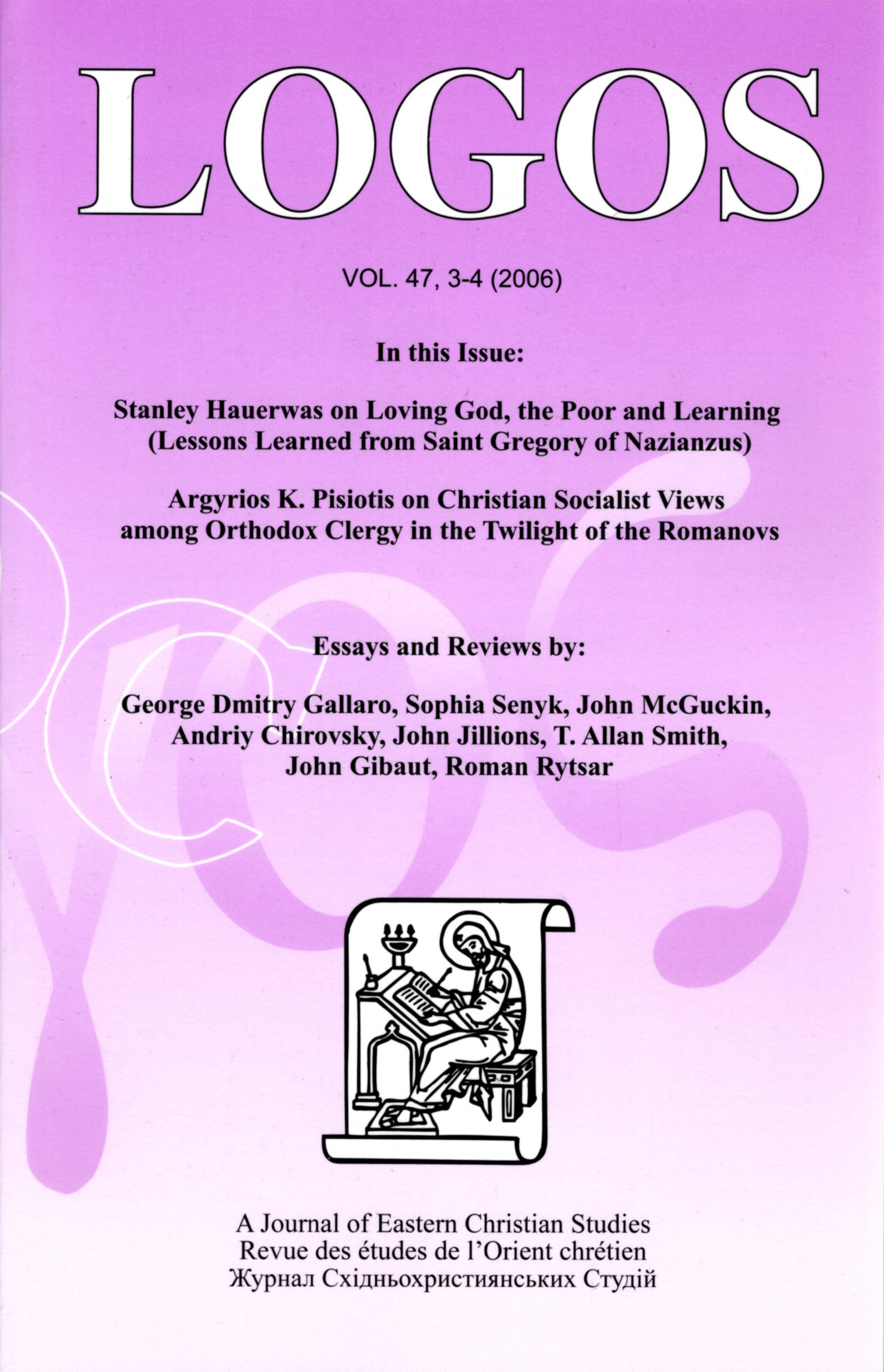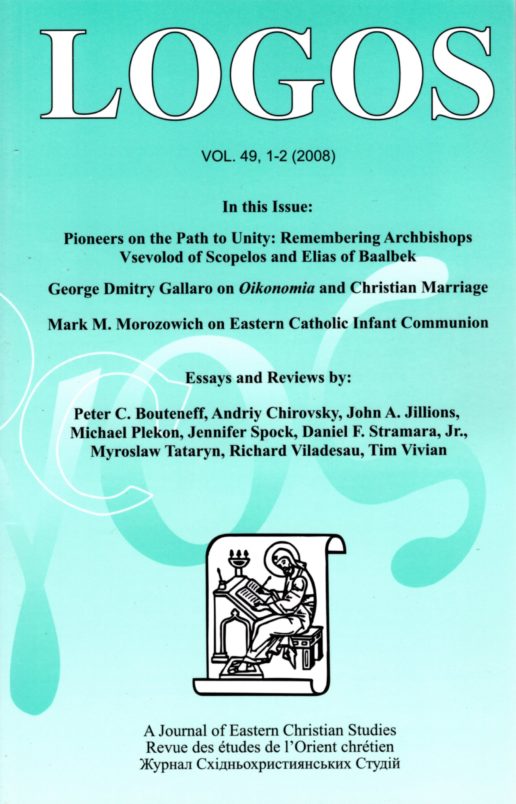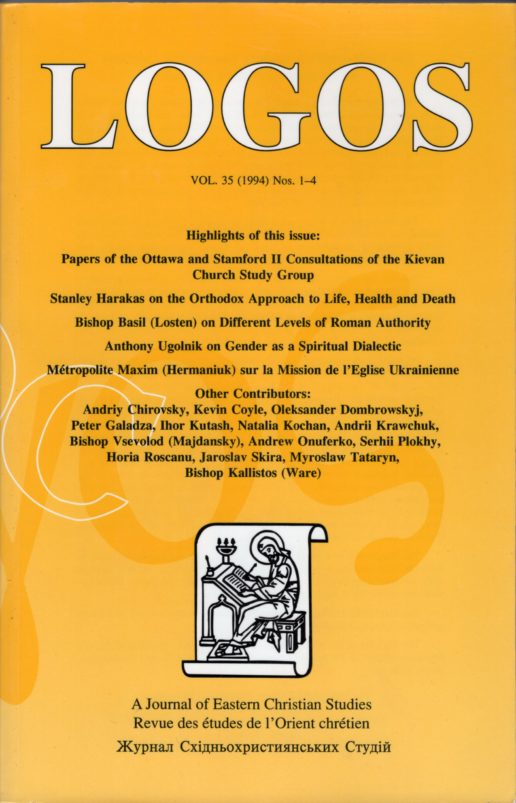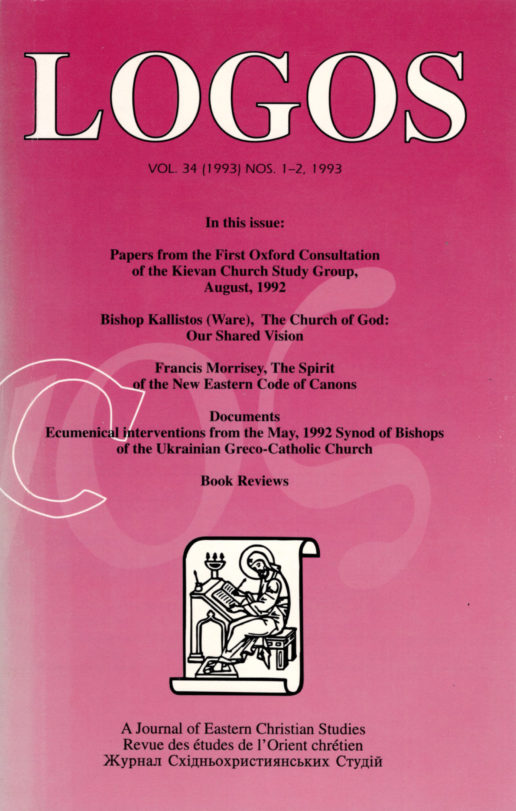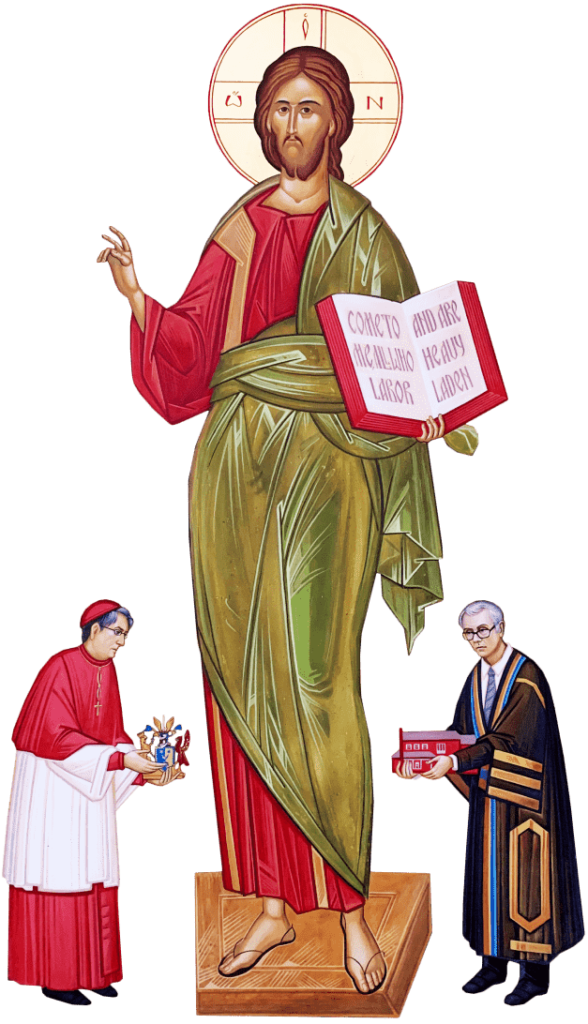Description
Table of Contents (PDF)
Editorial
East-West Ecumenism Back on Track? (1)
Articles
To Love God, the Poor, and Learning: Lessons Learned from Saint Gregory of Nazianzus (PDF sample)
Stanley Hauerwas (7)
Abstract
The author, one of the most prominent theologians of our time, examines the relevance of Gregory of Nazianzus’s oration “On Love for the Poor” and its implications for contemporary Christians and especially for academics. Drawing on the recent scholarship of John McGuckin, Brian Daley, Susan Holman, and Frederick Norris, Hauerwas argues that the Cappadocian father’s reflections on the poor were born of his family’s wealth and prestige but nonetheless put to powerful use rhetorically in defense of the poor and in arguing for the creation of a virtuous society where the poor could be seen as part of the commonwealth of God. Hauerwas describes the relationship between the poor and the university by envisaging the politics necessary for them to be properly welcomed, noting that universities desiring to both teach and especially live the gospel may need to have at the center of their work a l’Arche home or a Catholic Worker house or something similar. Such an arrangement would be in contrast to the sociopolitical and academic thought on poverty of modern liberalism which, Hauerwas says in citing Saba Mahmood, robs the poor of agency and leads to a monopoly of the state in ostensibly looking after them. In the end, Gregory’s lesson to us today is that to live as an ascetic need not be in tension with learning if we understand the discipline of thought to be one of the forms asceticism must take for the good of rich and poor alike.
“Любити Бога, бідних та науку: уроки від Святого Григорія Назіанського”
Автор: Стенлі Хауервос
Резюме
Автор, який є одним з найвизначніших богословів сьогодення, аналізує значимість промови Григорія Назіанського під назвою “Про любов до бідних” та застосування цих ідей в контексті сучасного християнства, а зокрема в академічному колі. Опираючись на нещодавніх дослідженнях таких авторів, як Джон Макгукен, Браєн Дейлі, Сюзан Холман та Фредерік Норис, Хауервос стверджує, що роздуми кападокійського отця про бідних зародилися на грунті родинного багатства та престижу, проте вони стали сильним риторичним знаряддям для оборони бідних та відстоювання думки про створення суспільства збудованого на чеснотах, де бідні були б частиною Божого народу. Хауервос описує зв’язок між бідними та університетом, коли викладає своє бачення впровадження необхідних змін для належного прийняття бідних в університетське коло, зазначаючи, що університети, які мають намір навчати, а особливо жити згідно з Євангельськими чеснотами, повинні мати в своєму центрі католицький будинок для робітників чи щось подібне. Такий підхід несумісний із суспільно-політичними та науковими ідеями сучасного лібералізму про бідність, який як зазначає Хауервос, з посиланням на Саба Махмуда, позбавляє бідних діяльності та призводить до монополії держави щодо опіки над ними. В підсумку, Св.Григорій вчить нас, що життя аскета не заперечує навчання, якщо науку розглядати як форму аскетизму, якої він повинен набути для блага як багатих так і бідних.
Christian Socialist Views among Orthodox Parish Clergy in the Twilight of the Romanovs (PDF)
Argyrios K. Pisiotis (29)
Abstract
In groundbreaking historical research and socio-religious analysis, the author utilizes mostly unpublished and previously unused sources from the Russian State Historical Archive (RGIA) and the State Archive of the Russian Federation (GARF) in order to show that pace the Russian clergy’s traditional image as apologists of tsarism and turgid functionaries of the state, from 1905 on many Orthodox clerics joined lay society in a revolution that shook the Romanov monarchy. Among the hundreds of clerics from all over the empire who took part in open debate and protests demanding the radical reform of absolutist government, the author concentrates on the examples of Vasilii Popov, Vladimir Lakhin, Iona Brikhnichev, Pavel Sokolov, and the “Khar’kov Five,” Pavel Grigorovich, Vladimir Kuplenskii, Vladimir Shapovalov, Ioann Filenskii and Nikolai Voznesenskii. These and other clerics often supported the same demands as other social groups, e.g., the freedoms of press, conscience, speech, association, and assembly as well as the abolition of capital punishment, the inviolability of residence and person, and wider land distribution. Clergymen were also incriminated in inciting peasants to violent acts against landowners and destruction of private property, or instigating riots and attacks on the police. Influenced by moral theology and diffuse socialist tenets, Russian clerics developed a distinct blend of Christian socialist ideas (and idealism), with strong populist and clericalist undertones.
“Християнські соціалістичні погляди православного парафіяльного духовенства в період занепаду династії Романових”
Автор: К.Пісіотіс
Резюме
В цьому переломному історичному дослідженні та суспільно-релігійному аналізі, автор використовує здебільшого ще ніколи недруковані та нові джерела з Російського Державного Історичного архіву та Державного Архіву Російської Федерації для того, щоб показати, що незважаючи на традиційну думку про російське духовенство як апологетів царського режиму та його тупих виконавців, від 1905 значна кількість православного духовенства разом з мирянами приєдналася до революції, яка похитнула монархію Романових. Серед сотень духовенства з цілої імперії, які взяли відкриту участь в дебатах та протестах з вимогою радикальних реформ абсолютизму в державі, автор виокремлює такі постаті, як Василій Попов, Володимир Лахін, Йон Брихнічев, Павел Соколов та “Харківську п’ятірку” : Павел Григорович, Владімір Купленський, Владімір Шаповалов, Іоан Філенський та Ніколай Вознесенський. Ці та інше духовенство часто підтримували вимоги інших соціальних груп населення, такі як свобода преси, совісті, слова, асоціації та асамблею, а також скасування вищої міри покарання, недоторканість житла та особи і ширшого розподілення землі. Духовенство також звинувачували в підбуренні селян до насильства проти їхніх поміщиків та в поваленні приватної власності, або ж в організації непокори та нападів на поліцію. Під впливом морального богословія та поширених соціалістичних поглядів російське духовенство витворило соєрідну суміш хрисиянських соціалістичних ідей (та ідеалізм) з сильним популістським та клерикальним забарвленням.
Notes, Essays, Lectures
The Theotokos in the Christian East and West (PDF)
George Dmitry Gallaro (81)
Review Essays
Lev Gillet, Communion in the Messiah: Studies in the Relationship Between Judaism and Christianity (PDF sample)
John A. Jillions (111)
Book Reviews
Iaroslav Isaievych, Voluntary Brotherhood: Confraternities of Laymen in Early Modern Ukraine
Sophia Senyk (131)
Gillian Crow, This Holy Man: Impressions of Metropolitan Anthony
Roman Rytsar (134)
John F. Pollard, Money and the Rise of the Modern Papacy: Financing the Vatican 1850–1950
Adam DeVille (139)
Charles Morerod, Ecumenism and Philosophy: Philosophical Questions for a Renewal of Dialogue
Adam DeVille (145)
Dennis J. Dunn, The Catholic Church and Russia. Popes, Patriarchs, Tsars and Communists
T. Allan Smith (149)
Brian E. Daley, Gregory of Nazianzus
John A. McGuckin (155)
Peter M. Doll, ed., Anglicanism and Orthodoxy: 300 Years after the ‘Greek College’ in Oxford
John Gibaut (158)
Arthur Holder, ed., The Blackwell Companion to Christian Spirituality
Andriy Chirovsky (163)
Briefly Noted (169)
Books Received (173)
Contributors (181)
Language: English, Ukrainian
Softcover: vi, 208 pages
Publisher: The Metropolitan Sheptytsky Institute of Eastern Christian Studies
ISSN: 0024-5895
Digital File: $14
Size: 1 MB
A link to the PDF file of this title will be sent to you. The PDF file is for your personal use only. You may not copy, share, publish, or sell the file. Protected by copyright of the Metropolitan Andrey Sheptytsky Institute of Eastern Christian Studies.

